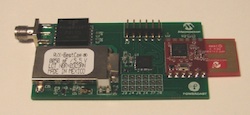Jun 28 2010
At the 2010 Sensors Expo & Conference, wireless power technology company, Powercast Corporation, demonstrated a RF-powered wireless sensor module with low energy consumption. The sensor receives power from the Powercaster transmitter and provides data on the light level, temperature, and humidity to an access point. It also displays the received signal strength (RSSI) and the ID number of the transmitter.

Recently, Powercast released P2110 and the P1110 Powerharvester Receivers that feature the capacity to convert radio waves into DC power in a 850-950 MHz range. Using the P2110 Powerharvester receiver, the demonstration sensor module first stores the energy received into a capacitor. Then, it boosts the voltage to regulate it to suit the supply requirements of the module components. Both P2110 and P1110 receivers equip microcontroller to ascertain the signal strength of the power received.
Support for the development of software and hardware was provided by Microchip Technology Inc. The PIC microcontrollers used in the devices feature the MRF24J40MA agency-certified IEEE 802.15.4 radio module and XLP eXtreme Low Power technology that deliver low power processing, high-performance, and effective communications. Consistent short-duration messaging, essential for the harvesting system’s optimal performance, is made available through the MiWi™ P2P protocol from Microchip.
Powercast Director of Marketing and Business Development, Harry Ostaffe, made a conference symposium presentation on ‘Design Techniques for RF Energy Harvesting Devices’ and during the main conference, he spoke on ‘Power Out of Thin Air: Ambient RF Energy Harvesting for Wireless Sensors’.